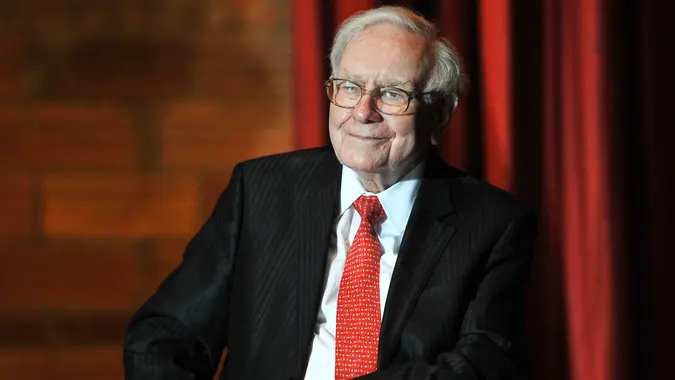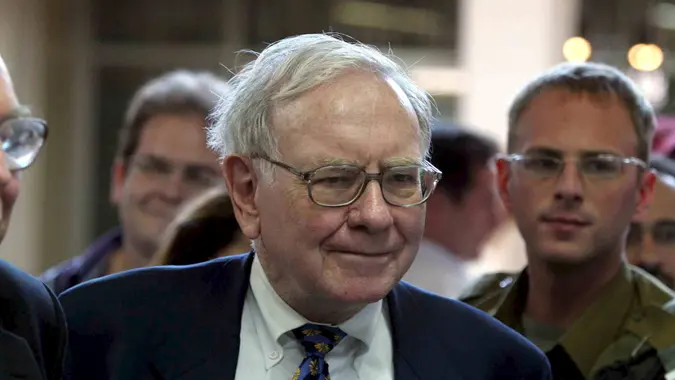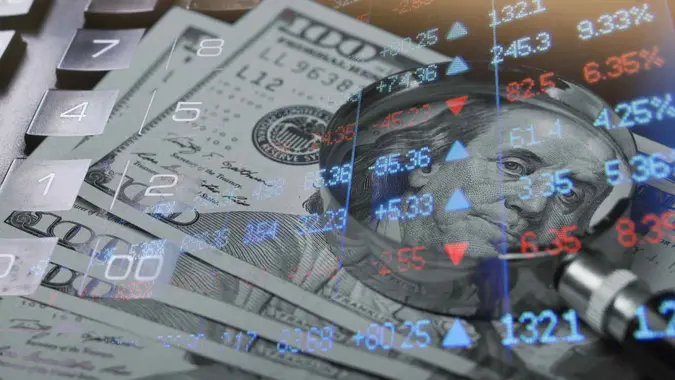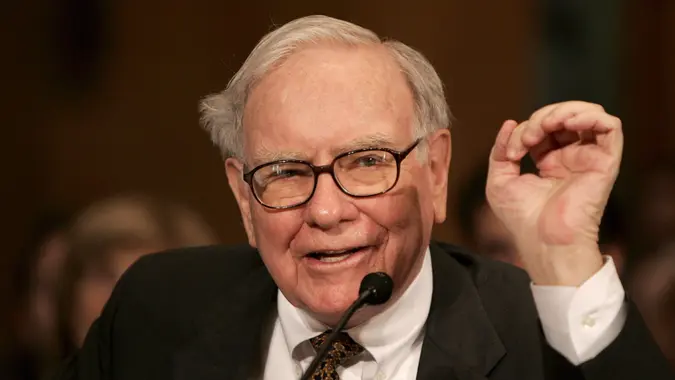As Traditional and Luxury Brands Gravitate Toward the Metaverse, How Can You Invest in Their Potential?
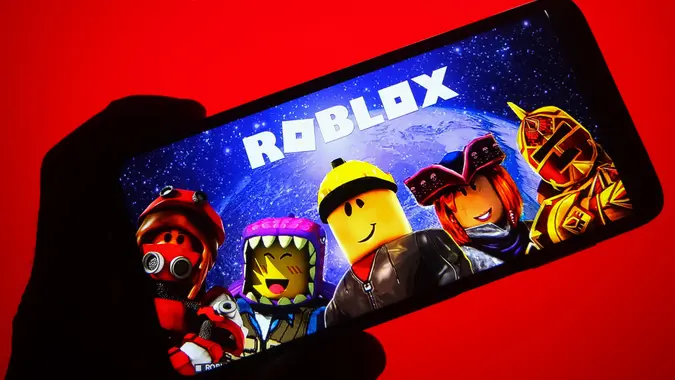
Commitment to Our Readers
GOBankingRates' editorial team is committed to bringing you unbiased reviews and information. We use data-driven methodologies to evaluate financial products and services - our reviews and ratings are not influenced by advertisers. You can read more about our editorial guidelines and our products and services review methodology.

20 Years
Helping You Live Richer

Reviewed
by Experts

Trusted by
Millions of Readers
The metaverse is everywhere since Facebook’s Meta name change last month. Now, the concept is becoming more mainstream, as several big-name traditional companies including Nike and Microsoft are embracing it. Not only that, but luxury brands such as Dolce & Gabbana are even joining in.
Find: 8 Best Cryptocurrencies To Invest In for 2021
Compare: 5 Nontraditional Ways To Build Your Wealth
Earlier this month, for example, Nike announced it entered the metaverse by partnering with gaming platform Roblox to create Nikeland, a place for Nike fans “to connect, create, share experiences and compete,” according to the announcement. “Nike created this bespoke world with the backdrop of its world headquarters and inside Roblox’s immersive 3D space, building on its goal to turn sport and play into a lifestyle,” the company said. Users can also style their avatars with Nike gear.
According to a Morgan Stanley report on the metaverse sent to GOBankingRates, these growing partnerships — and brands’ increasing willingness to experiment within Roblox — are important in building larger long-term in-game spend, as well as advertising and sponsorship revenue streams.
James Zhang, CEO of Concept Art House, a content developer and publisher for NFTs and video games, told GOBankingRates that companies such as Niantic, Nike and Microsoft are just the latest examples of how mainstream the metaverse is.
“There is belief that the metaverse will be the primary venue where humans connect in the future as our lives become more digital and virtual,” Zhang said. “As an investor, it’s less about whether to get on board or not, but what segment of the metaverse an investor should bet on. If Microsoft is entering the metaverse, it wouldn’t motivate me to buy additional Microsoft stock, rather I would back the companies that Microsoft needs to build a successful metaverse. For example, what is Microsoft’s solution for a safe, kid-friendly metaverse and if they need to acquire that, therein lies the opportunity.”
Indeed, Microsoft has entered the metaverse realm with Mesh for Teams, which allows workers to take the form of avatars and navigate virtual work environments, according to an announcement. The company said it is designed to make online meetings more personal, engaging and fun. “It’s also a gateway to the metaverse — a persistent digital world that is inhabited by digital twins of people, places and things. Think of the metaverse as a new version — or a new vision — of the internet, one where people gather to communicate, collaborate and share with personal virtual presence on any device,” Microsoft said.
Matthew Le Merle, Managing Director of Blockchain Coinvestors Acquisition Corp. and co-founder of Blockchain Coinvestors, told GOBankingRates that the chance that the internet could migrate toward a fully immersive state poses an existential threat to companies such as Alphabet, Apple, Facebook, Microsoft and Netflix. “They have no choice but to explore the metaverse concept today,” he said. “For Microsoft, their conceptualization of metaverse is just another innovation moving computing interfaces forward. What is different this time around is that now more than half of Nike’s and Microsoft’s clients are digital natives.”
Le Merle added that while 10 years ago none of us would have imagined we would all be immersed in real time video conferences online, 10 years from today, none of us will understand how we ever lived without immersive metaverse interfaces and experiences. “Love it or hate it, if you are a shareholder in Microsoft, you need them to continue to be at the leading edge of innovation. Metaverse is that leading edge — at least with regard to the interfaces that we use to do our work, education and play,” he explained.
Luxury brands are also jumping on the metaverse bandwagon. The Morgan Stanley report notes that while the metaverse will likely take many years to develop, NFTs and social gaming (online games and concerts attended by people’s avatars) present two nearer-term opportunities for luxury brands, “allowing them to monetize their vast IP built over decades.” They could even result in extra sales for the industry with potential to reach $50 billion by 2030.
More: The Rise of the Metaverse: NFT-Focused Investment Firm Sfermion Raises $100 Million
Dolce & Gabbana, for example, recently sold nine NFTs for $5.7 million, which is small in the context of the group’s revenues, but demonstrates the huge potential for virtual and hybrid luxury goods, according to the report. Morgan Stanley expects the NFT market to grow to $300 billion by 2030, with luxury digital/hybrid collectibles potentially being a $25 billion market.
Morgan Stanley added that it expects the whole sector to benefit from the advent of the metaverse, but sees the soft luxury brands (ready-to-wear, leather goods, shoes, etc.) as particularly well positioned as opposed to hard luxury (jewelry and watches). “Amongst the soft luxury participants, we see Kering (brands including Gucci and Balenciaga) as best placed given the group’s brand demographics and given head start in innovative digital collaborations,” the report noted.
The sentiment is echoed by Mark Elenowitz, president of global exchange and trading app for crowdfunded securities Horizon Fintex/Upstream, who told GOBankingRates that the metaverse represents a potential once-in-a-lifetime opportunity for creators, companies and brands to engage with their fans in ways never before possible. “The future shape of what the metaverse will look like is obviously still unclear, but I foresee novel forms of engagement between creators and users using a variety of crypto-focused technologies, such as NFTs or social tokens,” he said.
See: Decentralized Social Media on Solana’s Blockchain Could Change How Fast We Enter the Metaverse
Explore: Twitter Launches Crypto Dedicated Team — A Move That Could Make Digital Assets The Currency of the Internet
“The same can be done for existing megabrands such as Nike,” he said. “Imagine Nike holding a virtual sporting event with its athletic brand ambassadors who, in turn, use a Nike social token that enables holders to attend and participate in such events. In this way, the metaverse could unlock immense investing opportunities that benefit — and, indeed, further bring together — everyday users, celebrities and brands.”
More From GOBankingRates
 Written by
Written by  Edited by
Edited by 




